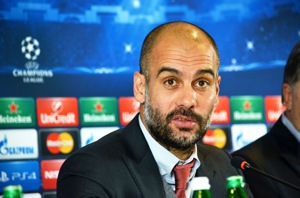What Do Footballers Do After They Retire?

Pep Guardiola (Vlad1988 / Shutterstock.com)
The professional life of a footballer is relatively short. With the majority turning professional at 16, many of these will be retired by the time they’re 36. Those that aren’t will most probably be playing in a lesser league than they played in at their peak apart from some goalkeepers whose top-flight careers can last well into their forties.
So, with another thirty years or so for most footballers till the state retirement age, just what do they do after they retire?
Football Management
Football management and coaching is the most obvious choice of career for a former footballer. Clubs these days are very conscious about equipping their players with skills that they can utilise to earn a living once retired, so many players begin training to be a football coach/manager whilst still playing.
They do this by going through the coaching pathway provided by the Football Association. Once retired, they then find a role at a club as a coach or manager.
It might be expected that the better the level of football a player has played at, the better the coach/manager they will be. There have been some top-flight footballers who have become trophy-winning managers such as Barcelona and Spain international Pep Guardiola, who is regarded as the best manager in the world.
However, many of football’s most successful managers did not play professional football at a high level or even professionally at all. Champions League and Premiership winning, Jose Mourinho, for example, was a translator at Barcelona before moving into management and had never played professional football. The reason for this is that playing football and managing football have two very different skillsets, resulting in some players having a far more successful coaching career than a playing one.
Some former players have even gone on to buying a football club. Former Manchester United players: Gary Neville, Phil Neville, Ryan Giggs, Paul Scholes, and Nicky Butt bought semi-pro Northern Premier League side Salford City in 2014.
The Media
From the beginnings of the Premier League in the 1990s which saw an explosion of football matches on our TV screens, the media has become a favoured destination for many ex-footballers. Some ex-players go into the media as commentators, summarisers or presenters after failing at football management but some see it as their preferred career.
Gary Lineker, presenter of the BBC’s Match of the Day, never wanted to go into football management after playing and was focussed on a career in the media since his early twenties. Because TV demands personalities and recognisable faces, TV is largely a career that attracts only those that have played at the highest level. However, you can often find former footballers that have played at a lower level working on regional sports programmes and writing football columns for local newspapers.
Business
Some footballers shun both coaching and working in the media for more regular ways of earning a living. Before the big paydays that were brought about by organisations such as the Premier League, this was how most footballers continued to make a living. One of the greatest players to ever to grace the game, Tom Finney became a plumber after he retired, building up his business across the North West of England.
Although players these days earn a lot more, many find the need to continue working in some form which is why you’ll find footballers owning and working in a variety of organisations and businesses. Stuart Ripley, who won the Premier League with Blackburn Rovers, is now a successful solicitor and lecturer. Former Northern Ireland international and Man City midfielder, Jeff Whitley, is a used car salesman, and former Wigan Athletic League Cup winner, Arjan De Zeeuw, is now a police officer in the Netherlands.
Players who never played in the top flight and plied their trade in the lower leagues will nearly all find the need to continue working with many retraining into a variety of careers once their football careers are over. You can find former professional footballers in a whole range of jobs, from bakers, postmen and builders, to accountants, fitness trainers and salesmen.